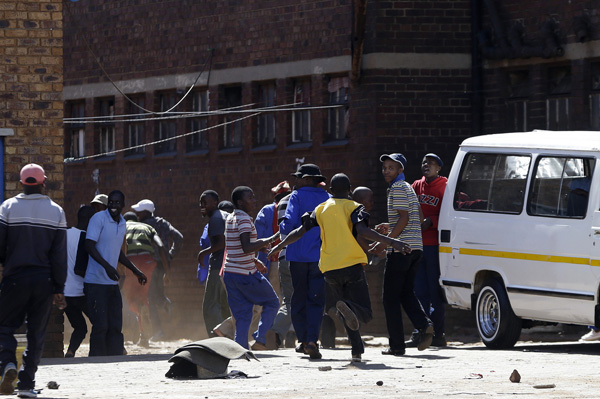China meets challenge of South Africa riots
Updated: 2015-04-23 07:52
By He Wenping(China Daily)
|
||||||||
 |
|
Local residents run away as police fired rubber bullets and teargas to disperse a crowd of anti-immigrant protesters outside a hostel in Actonville, east Johannesburg, South Africa, Thursday, April 16, 2015. Fears of anti-immigrant attacks have escalated sending foreigners seeking refuge in camps and a police station. [Photo/IC] |
On April 18, South African President Jacob Zuma canceled his visit to Indonesia to attend the Asian-African Summit in order to end the deadly xenophobic attacks at home. Goodwill Zwelithini, the traditional king of Zulus, too has called for an end to the violence that has swept across parts of South Africa.
The attacks on immigrants in South Africa are a serious issue, because they have claimed the lives of seven people and forced more than 5,000 foreigners to seek refuge in makeshift camps. The attacks have also dealt a deadly blow to the peaceful coexistence of different races which South Africa has boasted since 1994, when apartheid ended in the country.
Many have blamed Zwelithini for making an impassioned speech last month to drive foreigners out of the country. But the Zulu king's provocative words, which he has said were "taken out of context by the media", only served to inflame the passions and intensify the chaos that had already gripped parts of the country, especially Johannesburg and Durban.
Like the 2008 bloodshed, which mainly targeted Zimbabwean workers in South Africa and claimed about 60 lives, the latest burst of violence can be attributed to widespread poverty in the country. A large number of impoverished South Africans, mostly blacks, are unhappy with their livelihoods. Their anger and frustration have been often exploited by opposition parties to attack the ruling party, particularly during presidential elections.
After South Africa's political transition in 1994, blacks who comprise an overwhelming majority of the population, acquired equal political rights. Yet there was no improvement in living conditions of a majority of the black population. In fact, most blacks in South Africa have been struggling to emerge out of poverty, because 80 percent of the country's wealth is controlled by around 10 percent of the population (mostly whites).
The glaring income disparity in South Africa has widened further because of the country's sluggish economy in recent years. South Africa, home to a once-prosperous open market, which relies heavily on the global financial system, has suffered more than any other African country the consequences of the global financial crisis. According to official data, the unemployment rate in the country is about 24 percent, and as high as 50 percent among youths.
Besides, the slump in the value of rand, the South African currency, has accelerated the inflation rate, which was nearly 5.7 percent in 2013 and 6.3 percent last year. Compounding the matters is the less than 2 percent economic growth of South Africa in the past two years.
But South Africa is still a popular destination for foreigners because it remains the largest economy in Africa. The less-educated South Africans are infuriated because many of an estimated 2 million immigrants from countries like Zimbabwe and Mozambique have taken up unskilled and semi-skilled jobs, mostly in mines, farms and grocery stores. As a result, the attacks have targeted against immigrants.
Although not aimed against the about 350,000 Chinese nationals in the country, the attacks have still caused huge financial damage to their shops in Durban, and made China's job of protecting its citizens overseas more challenging.
Immediately after the anti-immigrant violence broke out, the Chinese Embassy and consulates in South Africa urged local police to take effective measures to protect Chinese nationals and their properties. They also issued alerts through various channels to remind Chinese nationals and enterprises to strengthen their safety measures. And the fact that no Chinese national in South Africa has being attacked so far speaks volumes about China's quick reaction in taking all measures to protect its nationals and their properties in the country.
The author is a senior fellow with The Charhar Institute, and a researcher at the Institute of West Asian and African Studies, Chinese Academy of Social Sciences.
- Global health entering new era: WHO chief
- Brazil's planning minister steps aside after recordings revelation
- Vietnam, US adopt joint statement on advancing comprehensive partnership
- European border closures 'inhumane': UN refugee agency
- Japan's foreign minister calls A-bombings extremely regrettable
- Fukushima impact unprecedented for oceans: US expert

 Stars of Lijiang River: Elderly brothers with white beards
Stars of Lijiang River: Elderly brothers with white beards
 Wealthy Chinese children paying money to learn British manners
Wealthy Chinese children paying money to learn British manners
 Military-style wedding: Fighter jets, grooms in dashing uniforms
Military-style wedding: Fighter jets, grooms in dashing uniforms
 Striking photos around the world: May 16 - May 22
Striking photos around the world: May 16 - May 22
 Robots help elderly in nursing home in east China
Robots help elderly in nursing home in east China
 Hanging in the air: Chongqing holds rescue drill
Hanging in the air: Chongqing holds rescue drill
 2.1-ton tofu finishes in two hours in central China
2.1-ton tofu finishes in two hours in central China
 Six things you may not know about Grain Buds
Six things you may not know about Grain Buds
Most Viewed
Editor's Picks

|

|

|

|

|

|
Today's Top News
Liang avoids jail in shooting death
China's finance minister addresses ratings downgrade
Duke alumni visit Chinese Embassy
Marriott unlikely to top Anbang offer for Starwood: Observers
Chinese biopharma debuts on Nasdaq
What ends Jeb Bush's White House hopes
Investigation for Nicolas's campaign
Will US-ASEAN meeting be good for region?
US Weekly

|

|









